1. Krampus, Austria and Hungary
St. Nick’s devil-like counterpart has one task: to punish bad children before Christmas. In other words, he’s no jolly fat man. Instead, picture a red devil with cloven hooves, horns, and a long tongue (though he can take the form of a bearded wild man or huge hairy beast). Instead of a bag full of toys, Krampus carries chains and a basket for abducting especially bad children and hauling them to hell. Experience this holiday tradition at Krampusnacht parties and Krampus Runs, during which rowdy revelers cavort through town in beastly costumes.
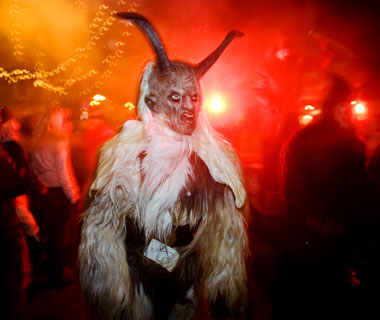
2. Ganna, Ethiopia
A brutal ball-and-stick game with high injury potential, ganna is how the Ethiopians do Christmas (it’s also their name for Christmas). According to local tradition, the biblical shepherds played the game when they first heard about the birth of Jesus. But ganna is anything but peaceful. The balls are made from olive wood or leather, which can easily knock out a player. Because there are no rules about the size of the fields, the goals are sometimes so far apart that neither team scores by nightfall on Christmas Eve.
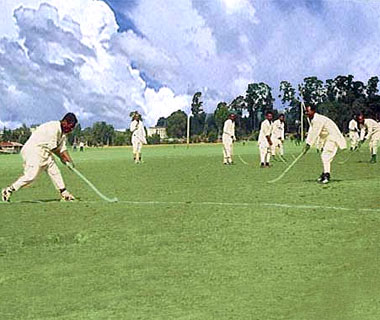
3. Mari Lwyd, Wales
Horses and Christmas go perfectly well together in Wales. Mari Lwyd translates as “Gray Mare” and involves carting a horse—either a life-size figure or someone dressed as a horse—door-to-door, accompanied by a group of colorful singers and dancers. The tradition is thought to be a holdover from pagan celebrations before Christmas was introduced to Wales. The ritual kicks off with traditional Welsh-language songs and a petition to enter the home for more music and merriment. It can also include a rhyme contest between the troupe and residents—a satirical back-and-forth not unlike a modern rap contest.
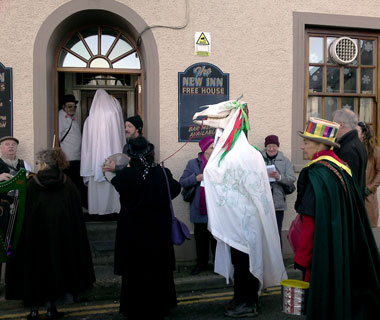
4. Zwarte Piet, Belgium, the Netherlands
In bygone days, Zwarte Piet—or “Black Pete”—was Santa’s black African or Moorish slave. In addition to helping St. Nick distribute gifts, Pete was given the dubious task of abducting naughty children and whisking them off to Spain, which the Dutch apparently thought was just as bad as hell. In recent times, the figure’s image/role has been watered down into something more politically correct, though not completely eliminated: the local who plays Black Pete appears in blackface.
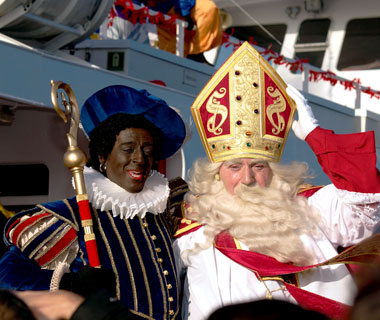
5. Kentucky Fried Chicken, Japan
Traditional Christmas dinner among millions of Japanese—most of whom are not Christian—is not turkey or ham, but a bucket of KFC. This offbeat custom is the legacy of a 40-year-old marketing campaign wherein the fast-food chain successfully convinced would-be customers that fried chicken is the traditional American yuletide feast. During the run-up to Christmas, Colonel Sanders statues outside KFC’s Japanese outlets wear Santa gear, and the chicken is served in special holiday packaging.
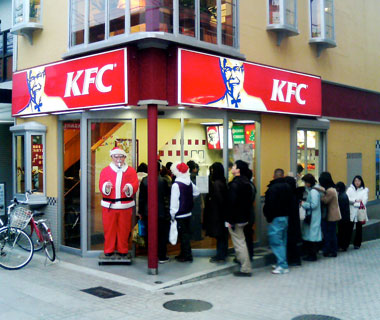
6. Spider Webs, Ukraine
This tradition harks back to a fairy tale in which spiders decorated the tree of a family too poor to afford proper yuletide ornaments. The rising sun on Christmas morning makes the tree sparkle and glisten in the same manner as modern lights and tinsel. Nowadays, Ukrainian Christmas trees are covered in spider webs made from various materials including crystal, paper, metal, and plastic.

7. Mummers, Latvia
Mummers are dancing musicians who parade from door to door during the yuletide season, often dressed up as bears, gypsies, or zombies. Having mummers play at your home drives out evil spirits and ensures the fertility (of crops, livestock, or wife) during the year to come. Once a yuletide tradition throughout Scandinavia, the custom crossed the Atlantic with early 17th-century Swedish immigrants who settled in Philadelphia and formed the roots of the modern mummers movement.

8. La Befana, Italy
Italian children believe their Christmas gifts are delivered not by St. Nick but by an old witch named La Befana who uses her broom to clean untidy houses. Scholars believe the neatnik witch is a medieval reincarnation of the ancient Roman deity Strenia, goddess of strength and endurance as well as the distributor of New Year’s gifts.
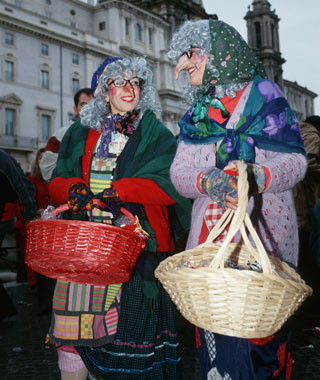
9. Consoada, Portugal
Consoada is a traditional holiday dinner on Christmas Eve that honors dead friends and relatives who can no longer join in the holiday celebration. One normally leaves an empty chair at the table for the alminhas a penar (“souls of the dead”) who may be present at the feast. Leftovers remain on the table overnight for hungry ghosts who might drop in later.

10. La Quema del Diablo, Guatemala
This ceremonial “Burning of the Devil” is a prelude to the Guatemalan Christmas and probably a remnant from pre-Christian Mayan days. Because the devil and other evil spirits are believed to dwell in the dark, dirty corners of your home, residents are supposed to sweep up, collect garbage, and amass everything in a huge pile outside. After an effigy of the devil is placed on top, the whole thing is lit on fire, ensuring a devil-free Christmas season for all who participate.
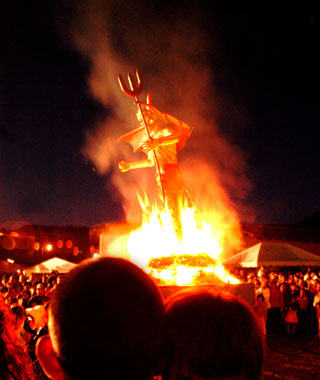
0 comments:
Post a Comment